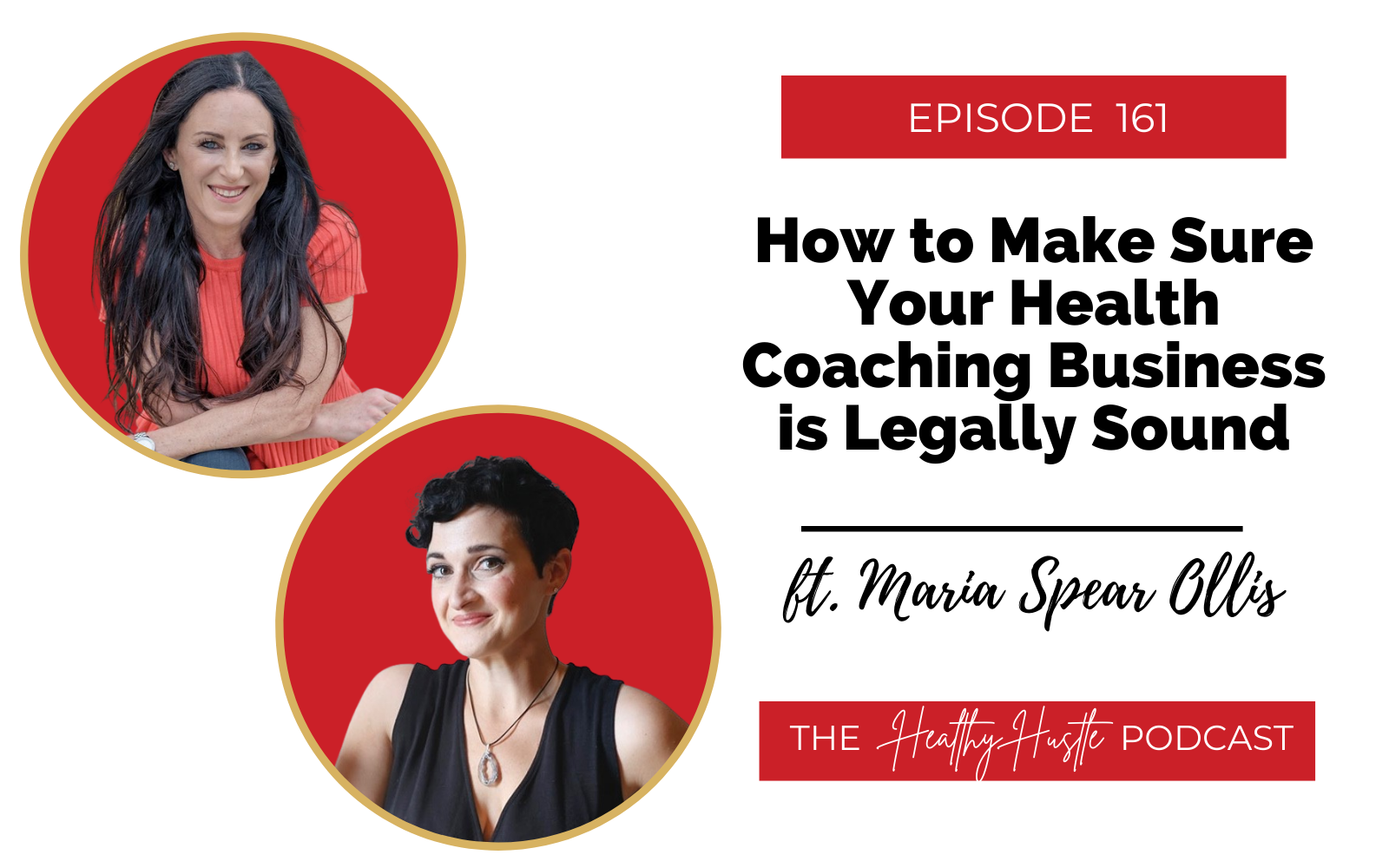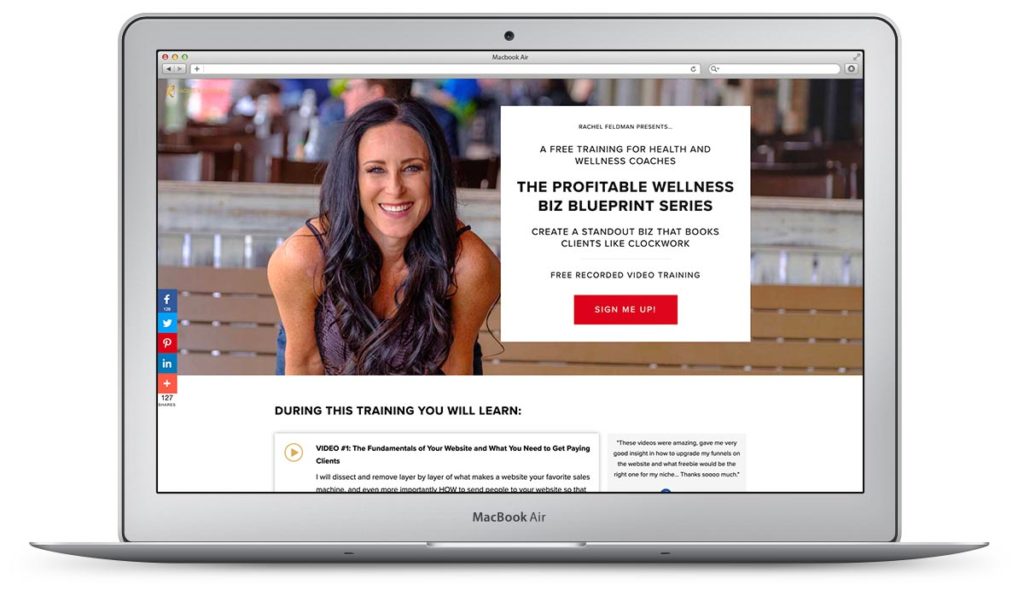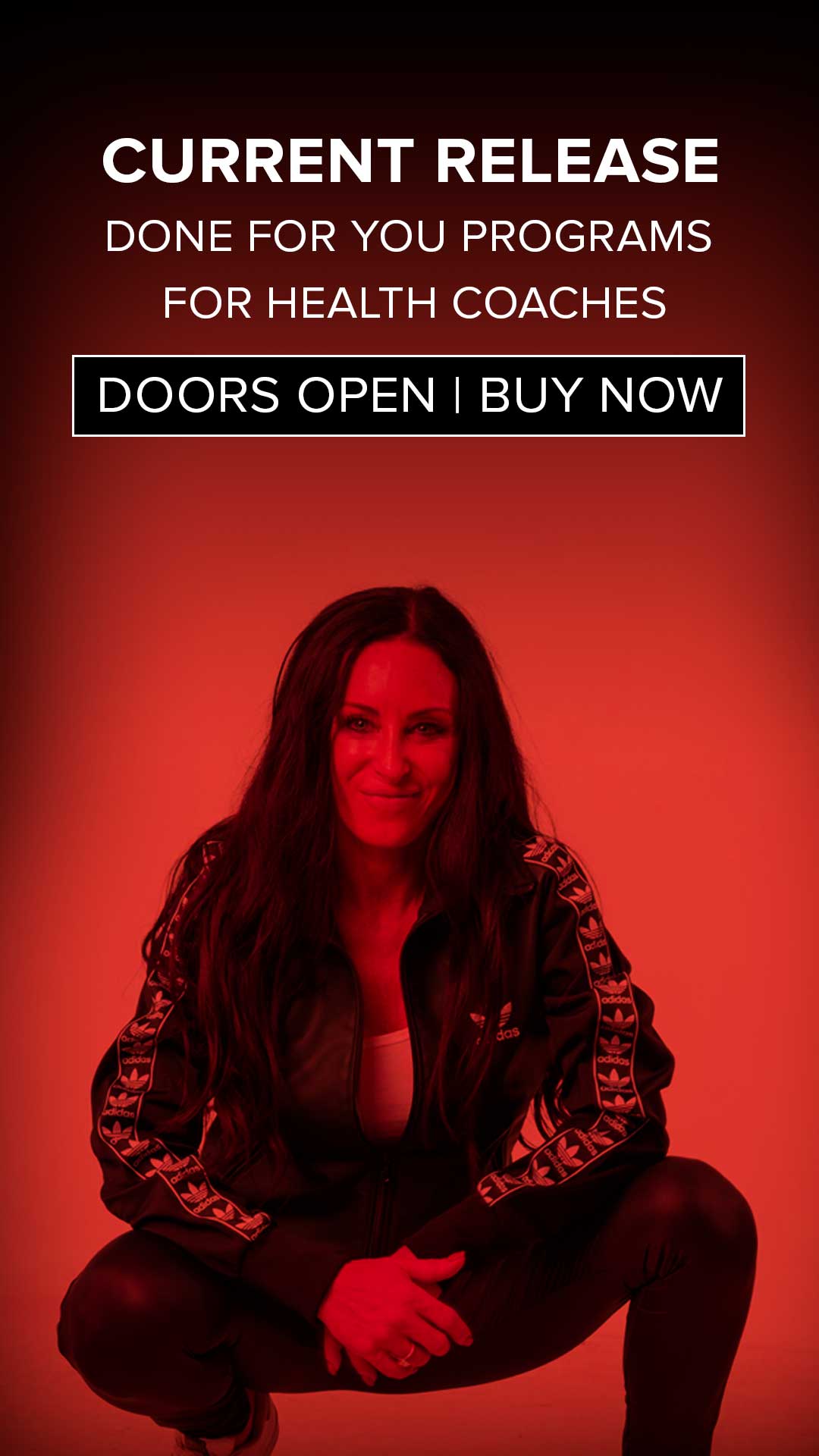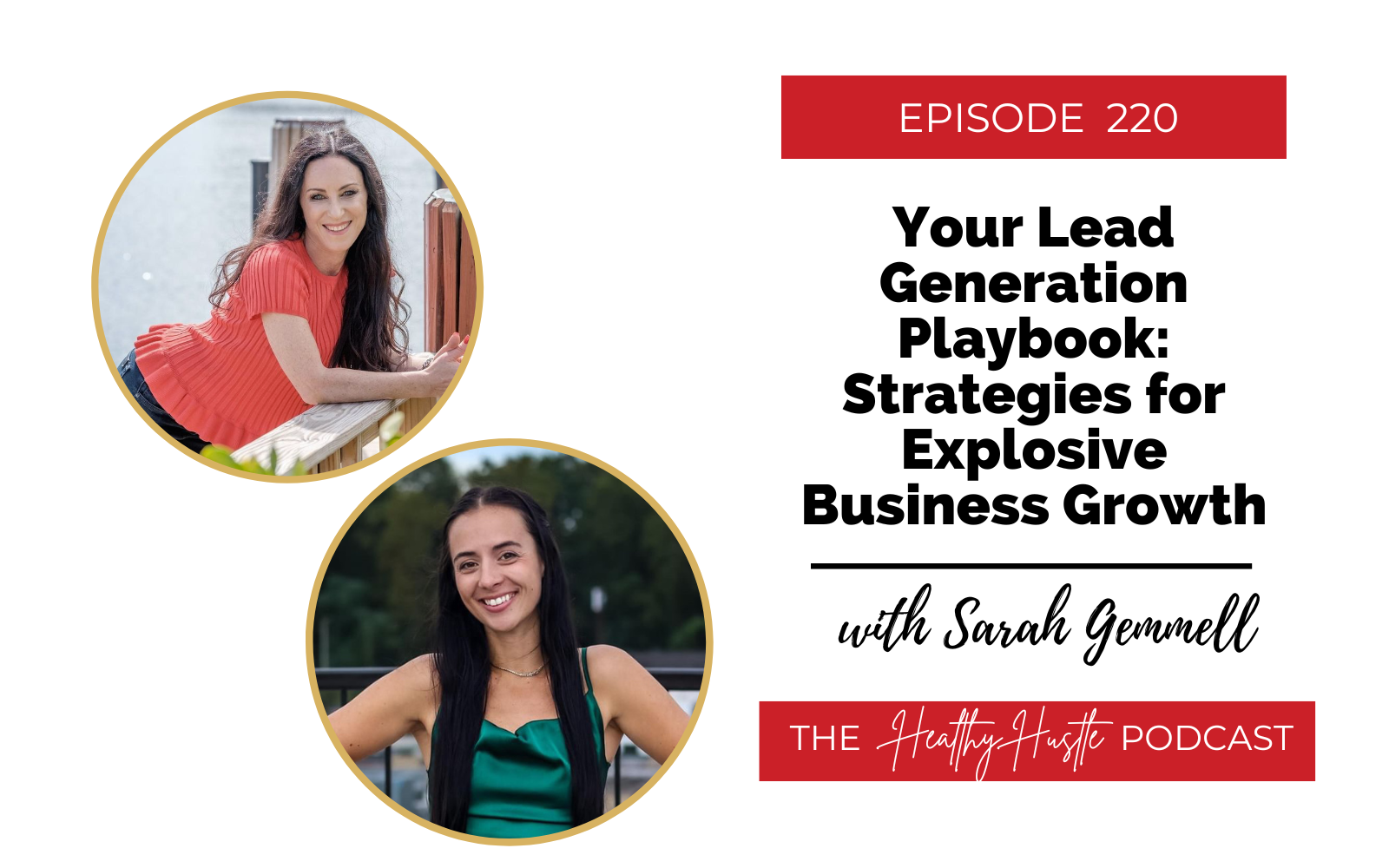As wellness coaches, we need to make sure we’re legally dotting our I’s, crossing our T’s, and asking questions like Are your contracts up to date? Do they reflect your offers? Are your Terms of Agreement and Privacy Policy on your website? Have you disclosed your affiliate links in the right locations?
A lot goes into making your health coaching business legally sound, but we need to protect ourselves first if we genuinely want to help our clients!

In today’s episode, I am talking to the fantastic Maria Spear Ollis, an IP Lawyer and Attorney who brings peace of mind to content creators and coaches when it comes to IP protection, contracts, and internet law. Maria is giving us the lowdown on contracts, how to protect our brand, the biggest legal mistakes most coaches make, how to make sure your content isn’t stolen, and all those things you want to know from an expert lawyer.
Connect with Maria:
Website: https://www.spear-ip.com/
Instagram:
https://www.instagram.com/heysomaria/
https://www.instagram.com/thelegalapothecary/
Rachel: Hey guys, if you’re a wellness coach, you are in the right place. My guest is going to give us the lowdown on contracts, how to protect our brand, and all those things that you are desiring and want to know from an expert lawyer. Maria Ollis, can you tell us a little about yourself?
Maria: I’m an internet and IP lawyer. IP meaning you’re covered and trademarked. I’m based in Nashville, Tennessee. I’ve been here for 12 years. I help coaches and thought leaders protect their creative content, their branding, their relationships, business relationships, and make sure they’re doing business legally online.
Rachel: As wellness coaches, especially, we really need to make sure that we’re doing this right. We’re telling somebody, eat this, don’t eat this and we really have to be careful. So why don’t we dive into those coaching contracts? Because they scared the bejesus out of me.
Overcoming The Fear Around Implementing Contracts Into Business
I didn’t want anybody to think I was creating too much of this boundary. I know that sounds crazy. But in the beginning stages of my business, I was extremely scared. Oh my god, they’re gonna have to fill out these additional contracts. But later, I started to see how important it was. So let’s talk about these contracts that a coach needs.
Maria: A lot of it comes down to practicing what we preach because I know a lot of coaches talk about boundaries. But a lot of coaches are very giving. And so there’s this mindset thing that happens when it’s your business and your contract where we don’t know how somebody’s gonna feel if we present them with a contract. We also don’t want to be pushy. We don’t want to put a document in front of them with a bunch of legalese, they get scared. And then they ghost us.
So there’s a lot of emotions and mindset issues when it comes to contracts. But if you peel all of that back, truly all a contract is is it’s there to make sure you and the client are on the same page in terms of who’s paying what, in terms of what you’re going to be doing for them, so that they can’t come back and say, Wait, I thought we were going to be doing this. It’ll eliminate confusion.
What Goes Into Contracts For One On One and Group Coaching Clients
Rachel: So lessen the anxiety and get the contract. Say we have a person who’s doing one on one coaching, what type of contracts do you suggest for that? Is that any different from group coaching?
Maria: Yeah, so what it would come down to, there is just a difference between what you’re providing. In a group in a group setting, if there’s another platform that you’re using, a Facebook group, or Voxer support as a part of it, just spelling out what goes into that package, as opposed to anything one on one coaching, what goes into that package?
Rachel: If somebody’s doing a group, when do you typically suggest to your clients that they provide this contract? Because nobody buys?
Maria: Yeah, when they’re in that buying process, so many people are used to seeing if it’s a group coaching program, so it sometimes even depends on the size of the group. It might depend on how you have your current setup or your website or setup. It might be a click to agree.
Now, I am all about efficiency and having your privacy policy on your website and that kind of thing. I’m hesitant to say to you the click to agree in a group coaching setting because you actually want them to look at it. You don’t want them to just click a button and be okay, great, I gotta coach because you want them to really understand what’s included. So keeping that in mind that that’s what’s important, so that everyone knows what’s being performed and what’s included.
Rachel: So for somebody to buy, and then maybe individually send them the contract.
Maria: Yeah, that’s probably a best practice. Make it the easiest. And then if you’re doing one on one, I assume that you’re just including that in your package and working with somebody too.
Rachel: Can you put them into any third party platforms to make it easier?
Maria: There are options. So there’s Dubsado, HoneyBook, those types of platforms? You can use them so that it auto-populates what’s included in your diamond package versus your sapphire package, whatever it is, that could even do that. Even Acuity, I bet you can put your contract right in there as well. I know a lot of coaches use Practice Better and I’m assuming that can be done.
What To Include In The Contract On Your Website
Rachel: Wonderful. So we have the contracts for your coaching. And then we have the contract on your website. Let’s talk about those contracts on the website.
Maria: So on your website, there are two main contracts or policies that we’re talking about. The first is your Terms of Use. Sometimes people say Terms of Service, they’re really the same thing. It’s usually in the footer of your website, and the other is the privacy policy.
The terms of use are really a contract between you and the user, or the person viewing your website. And it can vary if you’re selling products on your website. In your Terms of Use, you’ll want to have a refund policy if it’s a physical product, add your disclaimers on if you use this the incorrect way or if you get injured. You want to cover your behind.
But also, this is not medical advice, so you always need to check with your doctor before starting something new. That kind of stuff is more in the terms of use.
Whereas the privacy policy is more of a here’s the information that we collect from you and here’s what we do with it. There have been a lot of laws in recent years that crack down on this. It’s really more for if you’re selling your user’s information. A lot of coaches aren’t really doing that. But that’s the purpose is to make sure you have a policy that makes clear to your user, the type of information you’re collecting, whether it’s actually information that they’re inputting, their email address, or if you’re tracking them with Google Analytics or tracking their IP address or something. Let them know that you’re tracking that and how you’re using it.
Rachel: I’ve heard of a platform Termly, do you suggest that people go there? Or is it really important to work with somebody like yourself?
Maria: It depends on your comfort level. There are platforms where you can pay a monthly fee and if the law is updated, then they’ll update your policy. I would say just, No and no. Not everybody wants to do it, but read it to make sure that it makes sense to you. Because if it doesn’t make sense to you, it might not make sense to you there.
Rachel: And do you have it where people can personally work with you?
Maria: Yeah, absolutely. I also have some templates for sale on my website. But yeah, happy to work with folks. So on our Terms of Use and Privacy policies and coaching contracts.
The Biggest Mistakes Coaches Make On Contracts
Rachel: What are some of the biggest mistakes that coaches make around their contracts?
Maria: Not drilling down enough on the services that are included and that comes back to boundaries. I’m not a coach, I’m a legal adviser, I guess you’d say. But my Enneagram is the Helper. And so many coaches are that same way. That’s why you’re in this industry is to help. And so some have the tendency of over delivering, right?
With the client, if there’s a misunderstanding, and the client says, I thought you were going to do this, then you say, Okay, let’s just do it. Make sure to guard your time in terms of what’s included.
Also have a clear cancellation policy or rescheduling policy, because, again, there’s only 24 hours in a day, there are only 30 or 31 days in a month. If you block off time and devote it to a client, you are closed off from adding business on that day, you know what I’m saying? Yeah, so it’s treating yourself the way that you would treat others and have it clearly defined.
Rachel: Yes, absolutely. Would you say that good practice in the beginning of working together is actually going over this contract?
Maria: Oh, that’s an interesting idea. I think maybe not the entire contract, but certainly that’s the way to get a hold of me. Here’s what you can expect, cancellation policy, those things for sure.
Rachel: I love that. I think making it simplest for each coach and trying to visualize what that looks like when you’re doing a group. What that looks like when you’re doing one on one.
Contracts, Forms, & Wording For Affiliate Links On Your Website
Let’s get to contracts or forms that you need for affiliate links. What do we need to know? Because I know lots of coaches have Amazon stores, lots of coaches do affiliate links with other people. What does need to be said on your website?
Maria: The most important thing to remember is that the FCC have said that when it comes to affiliate links, or even sponsored stuff, on your website, you should have that little disclaimer, where your affiliate links are –not on a separate page.
So instead of seeing my affiliate link policy here and having a hyperlink, if you have supplements or whatever it is a section on your website, where you’ve got your links there, put that disclaimer right there. You don’t have to say how much you’re being paid. You can wordsmith it so that it only recommends products that you’ve yourself or are on brand with you. But making it clear that these are affiliate links will help support my business, whatever it is.
Essential Steps To Protect Your Brand
Rachel: I love that. So let’s turn this conversation in a different way. We talked about securing contracts and forms and policies. Let’s talk about making sure that you are building a brand that you’re protecting. So what are really the essential steps to protect your brand?
Maria: So in terms of your brand, a lot of times your brand might be your actual name, it might also be something more unique
Rachel: Wellness with Rachel.
Maria: Exactly. And so the thing that I tell people that is always a glass-breaking light bulb going off is that you can use the TM symbol, even if you don’t have a registered trademark, you don’t have to wait until you have a pending or registered trademark to use the TM symbol.
Now, what does that do? That shows that you consider that name to be your trademark. And also because a lot of people don’t know the difference between TM and they see that TM and they think, ooh, she’s got her name trademarked? r? I better keep my hands off that one. So that TM symbol can really help you ward off would-be copy cats.
Rachel: So that brings me to a great question. We’re talking about brands and we think about coaches having their own programs, having their own content. When somebody does copy your entire profile, and I’m seeing this a lot on Instagram, can you take any legal action? It’s Instagram. So I think mostly you’re reporting that. But I want to talk about that. And then I want to talk about somebody else taking your program.
Maria: Yes. Okay. So are you talking about when someone creates an imposter account that they’re pretending to be you?
Rachel: Yeah. It has been incredibly frustrating and is happening left and right.
Maria: Yes. Okay, here are my tips. In scenario number one, make sure that your little Instagram picture is your face. Because even if you report it to Instagram, if it’s your logo, and it’s a logo that’s not registered with a trademark office, it’s hard for them to know it’s you. There’s a whole procedure where you can take a picture of your ID to show that it’s you and then they will take down the imposter. So that’s why it’s good to use your face instead of a logo or instead of a really tiny full body shot. Make sure your face is visible.
The other thing is, work to get that blue checkmark. Not everybody can do that. But it helps. And then encourage people to sign up for your email list because your email list is yours. Push that email list every once in a while and knock on wood if it happens Start notifying friends, start notifying off of Instagram so that nobody gets confused. Start notifying people that hey, there’s this person out there, can you submit a takedown on Instagram?
Rachel: Really, what it sounds like is it’s important to have your list because your social media can be gone in a day. That’s why I’m such an advocate for having your list.
How To Make Sure Your Coaching Program Isn’t Copied Or Stolen
So I always hear these coaches say I’m so scared that somebody’s going to steal my program. What can they do to ensure that this is not going to happen to the best of their ability? I know that there’s always going to be something that happens. But what can coaches do to ensure that they have good healthy copyright copy?
Marie: The first thing to understand is the difference between an idea and an actual protectable Copyright. So I have two go-to examples. One is Uber and Lyft. Same thing, same idea, different execution, different logos, maybe different interface when you open the apps.
My other example is Amy Porterfield and Jenna Kutcher. They’re two really popular marketing gurus, they each have a course on building your email list, right? The idea for a course on building your email list is not what’s protectable there, what’s protectable is what’s in the program, the videos, the worksheets, the text, and graphics and images and things that go into the actual building out of the course, not just I have an idea for a program.
So that’s the first part of it is determining, have they actually taken part of my program? That’s a problem. Or have they taken an idea for a program and made it their own? It still stings. But it’s not the same type of legal issue that it is if someone actually takes your content.
Where To Place Your Copyright
Rachel: So putting a copyright in the footer,or at the end and the beginning of the content? What would you suggest?
Maria: Definitely putting a copyright notice on any worksheets and videos is a great idea. Also, there’s an option of registering that content with the copyright office, it’s relatively inexpensive. The Copyright Office does have tutorials on how to register content at the office. So you can go through there. You can hire an attorney to help if it’s overwhelming, but they do have tutorials on the Copyright Office website.
If you don’t register with the copyright office, you still have rights, you can still stop someone if you found out that they’re copying. When you register it, you can stop someone and you’re legally entitled to get your attorneys fees. And you’re legally entitled to get at least a certain amount of money at as little as $750 per infringement of your work and up to –in really extreme cases– $30,000 increments. You hope it doesn’t go to a lawsuit, because that can cost more than a lot.
it’s good to have that in your back pocket. Because if you have to send a cease and desist letter to someone, you’ve got that registered copyright, and they see that you’ve got that registered copyright. Then it’s like, Ooh, I don’t want to be on the hook for a lawsuit and attorneys fees and all of this money, so they’re more likely to pay attention.
Rachel: I think that’s interesting and I think that part does sting. But I love that example that you brought up of Jenna Kutcher and Amy Porterfield. I don’t look at them in any competition because they’re so uniquely different. And of course, our programs and our courses are going to be so uniquely different because we’re different people.
So we’ve been talking about contracts, policies, copyright, and protecting our brand. What are some other areas that we don’t think about when we think about protecting our brand?
Maria: It’s important to remember when you are creating content or adding content on your website or with marketing or whatever it is. If you have a podcast, if you have a YouTube show, make sure that any stock images, graphics photos, those stock things are properly sourced.
So you’re going to legitimate websites. There are free websites. Unsplash is a great example of royalty-free images. But make sure that you are not just Googling royalty-free images and taking images from Google image search or from Pinterest.
Rachel: I remember learning that lesson because they were cracking down on so many people doing it. I didn’t think that it was wrong until somebody was like, you’re gonna get yourself in trouble. Do not even do this.
So is there anything else that I’m missing as far as protecting our business?
Maria: I think we’ve gone through it, we’ve gone through name, we’ve gone through creative content, we’ve gone through website policies, and using content online. We talked about affiliates and disclaimer and disclaimers and sponsored posts. Yeah, we’ve talked about a lot.
Rachel: Before we even wrap this up, tell me your suggestions for that coach that is scared to bring that contract out, because they may lose? What energetic component is there? You said it’s a beautiful contract to not lose relationships. But how do you look at contracts?
Maria: You have to get into that abundance mentality and that scarcity, and that if you hand someone something, then you’re going to lose them. Essentially, what you’re saying by doing that is, oh my making sure that I’m protected and I’m covered. That’s less important than getting this client because there might not be other clients. And I’ve been there. I’ve been in business for seven years. And at the beginning, you want the client. You don’t want them to be scared.
Rachel: It’s so scary. Nobody talks about it. Let me ask this question, because we’ve talked about all these amazing policies and contracts, but you have to feel confident to do it and when to deliver them.
Maria: Yeah, so just having that contract mindset, it’s just to make sure that you and your client understand what the expectations are of this relationship. That’s it. We can’t preach boundaries and abundance and wellness to our clients if we’re not setting an example and practicing those things ourselves.
Rachel: I love that. The contracts your boundary.
Maria: Yeah. That is, it’s your beautiful boundary for your business loving boundary.
Rachel: Well, can you tell everyone where they can find you?
Maria: Absolutely. I’m on Instagram, mostly at Spear IP law. My website is SPEAR-IP.COM That’s us.
Rachel: Awesome. Thank you so much! Make sure that you listen back to this episode. There’s a lot of things that we talked about that are really necessary for you to have a thriving business and one that you don’t have to be scared that you’re going to lose it all. That’s why we talked about brand. We talked about contracts. We talked about forms, we even talked about affiliate links. So make sure that you go and listen. Follow Maria and if you have any questions about her work, contact her. Maria, thank you so much.











